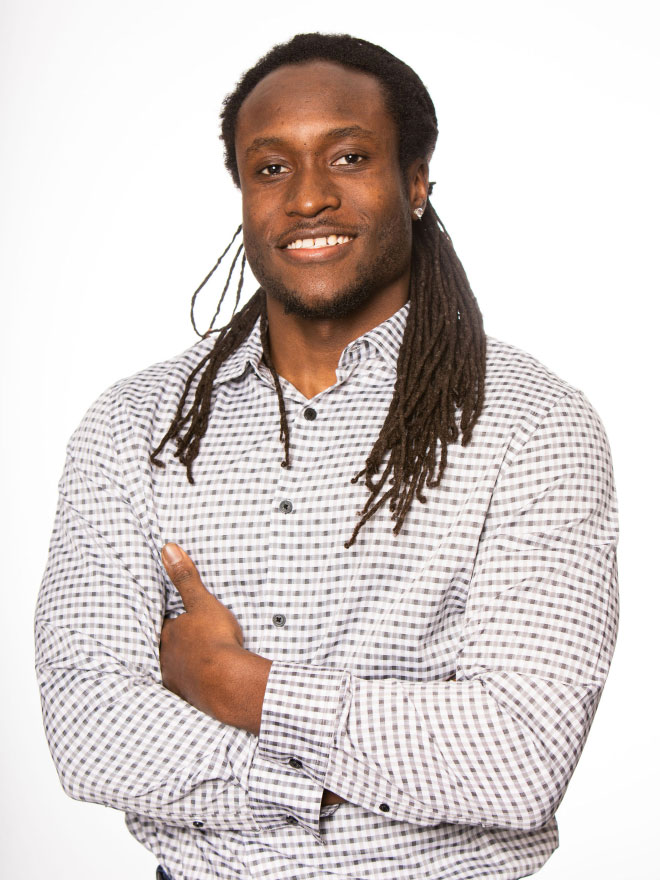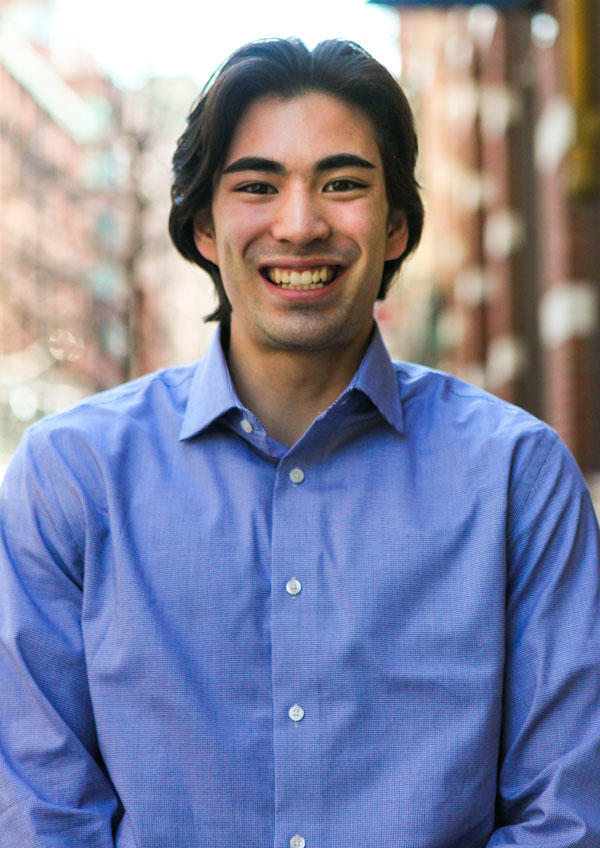
Co-founder & CEO, Shtudy
Yes, I did. I started my first business when I was 15 years old. It was a clothing line, and I had just earned my learner’s permit. I drove around all day and night delivering shirts out of the trunk of my car. I made $30,000 in one summer and instantly fell in love with business. I learned I had an innate skill. It was empowering to know that I could directly gain more wealth for my family while also doing good in the world. But it wasn’t all about the money… the feeling of providing value to someone else is what I love most.
My most notable introduction to social impact being tied to business was during the Social Venture Innovation Competition at UNH. Prior to entering the competition, I hadn’t often fathomed how a socially driven company could also be high-growth and scalable.
Now I am running my company full-time as a cofounder and CEO. My company is called Shtudy. Shtudy is a career advancement platform that pre-vets, trains, and connects top Black, Latinx and Native American tech talent of color with companies that are trying to improve diversity and revenue within their workforces. It’s important for our candidates to work at places where they’re not only appreciated, but where their career growth is cultivated. Our goal is to bridge the racial wealth gap in America, and we feel that increasing diversity in tech is the most effective and efficient way of doing that. Shtudy started as just an idea in college. Having success from entering the SVIC really helped spring the business to life. Now that we’re three years in, we’ve raised over $150k in funding and are able to dedicate every single day to helping job seekers expand their career opportunities.
Yes, very much so. In fact, the primary motive for me to start Shtudy was because of the substantial social impact we’d have by bringing it to the masses. It is important to understand that a company is only a vehicle to create the change you want to see brought into the world at scale. Commonly entrepreneurs ask me, “how did you manage to add such a captivating social mission to such a profitable business model?” I tell them that they are thinking about it backwards. Your passion – your purpose – for starting the business should always come first. Whether it’s a socially impactful business or not, it’s vitally important to fall in love with whatever you start if you want it to grow and thrive. Why? Because things get tough, and sometimes when you’re the only one who still believes, love is all you have to keep you going. The money will come and go. But falling in love with your ability to improve peoples’ lives helps you find your purpose here on earth. And nobody can take that away from you. Holding on to your purpose is what makes building a business worth it.
I think it’s vital for all students to be exposed to some sort of social innovation and sustainability-focused education, but especially business students! Exposure to social innovation helps you find your passion. After all, how are you going to start a business if you don’t know what change you want to bring to the world?
Business is only for the bravehearted, it’s not all about the glory, money, fame, or success. In fact, it’s the opposite. What keeps you going when everything else is telling you that you should quit? It’s your passion and desire. Social innovation and sustainability help students find that within themselves – heck, it did for me!

I knew since my junior year of high school that I would want to major in business come college, though it wasn’t until recently that I found a true passion for social innovation. My entire life, I’ve always been interested in helping people, and business in my eyes was always the most impactful way to reach large groups of people. I was never sure prior to college how I wanted to pursue this, but I knew I would make it happen somehow.
The experience that really altered my state of mind when it comes to business, best practices, and capitalism as a whole was Semester in the City (Spring 2020). I was placed in a cohort with more than 40 other amazing, diverse, and driven humans who are seeking the same permanent change that I am, and as I learned with and from them, my understanding of systems in both America and the world completely shifted. Hearing their stories and empathizing with their vastly unique backgrounds while simultaneously taking classes focused on social justice and equitable systems across industries opened my eyes to a plethora of tragic, real-world problems that impact millions of Americans daily, just not me.
During this time, I was partnered with FamilyAid Boston, one of the largest providers for homeless families in the Commonwealth. Before this, I had never known about the massive issue of intergenerational poverty that impacts thousands of children and parents just 45 minutes away from my small, privileged hometown, or the fact that 90% of these families are families of color with the large majority of them being headed by single moms. That semester really ingrained in my head that I was born with an incredible amount of my own privilege (half-white, cis-gendered male with financial stability and little physical and mental health issues) that so many others will never have, and it is up to those with privileges like these to start taking a stand for voices that have been silenced and for people who don’t have the resources to make high-impact change on their own.
I used to aspire for many different things in my career upon my graduation from Paul College. I wanted to help people, but I was willing to limit that if it meant I could also be wealthy, live an overall relaxing life, and maybe even become a little famous. However, I know now that this is ignorance in its fullest. I have the choice to live in a “bubble,” work solely for myself, my needs, and my wants, and ignore outside problems. But this is a choice that many, many others don’t have (and will never have), and it’s a choice that I do not deserve to make over anybody else. So my decision in this choice isn’t the same as it used to be – I will not only have social innovation and sustainability play into my career, but my hope is that these two things will be my career, and that I can use everything I’ve learned to make this country more just and equitable for everyone.
Absolutely. In fact, I think in a capitalistic society and particularly in America, business leaders hold most of the power in leading and making effective, lasting change, even over many local and state governments. Large, private businesses in this country run the economy, as we’ve truly seen throughout COVID, and the economy is what government focuses on most. Maybe this is why some people are weary about how having more than one bottom-line (such as “planet” and “people” over profit) may impact the viability of a business, but it must be recognized that the world today is immeasurably different than even 20-30 years ago. Today, bottom lines are not mutually exclusive. Being sustainable and socially responsible is actually profitable for many companies as younger generations have prioritized these themes in their own personal lives. Across the nation, people are beginning to have a more collectivist mindset rather than an individualistic one, and although this isn’t always reflected in our day-to-day actions or through the actions of the government, businesses have the opportunity to leverage this to both make money and make change.
I don’t just think that it is important for all business students to expose themselves to some education in social innovation and sustainability (and all connecting topics), but in my mind it is IMPERATIVE for ALL STUDENTS to expose themselves to A LOT of these concepts, regardless of career/industry/etc.. Social innovation isn’t just a made-up business concept that was coined to garner a new target market, it is based off of legitimately helping to work against the huge number of barriers placed against certain groups of people and/or the environment that were produced as natural consequences of capitalism. And these barriers aren’t just seen in the business world – they are seen in every nook and cranny in the nation, and they impact more people than any of us will ever be able to grasp. Regardless of what industry you go into, you must take the necessary steps to educate yourself so you can get a sense of whose lives you are impacting, because no matter what you do, your work will impact others.

When I was applying to school I applied into the business school, but what ultimately made my choice to come to UNH was the fact that it had so many other options and gave me the ability to change my mind and not feel like I had to be strictly business once coming here. At the time of applying, I had very little knowledge of the social innovation movement, other than my brother being an Environmental Science Major. I took a natural resources class as part of my degree requirements freshman year. It was during this class that I really learned about more than just the environment being at stake, and what being sustainable really meant. I didn’t get truly immersed into the importance of the movement until I applied to be a part of the B Impact Clinic, hoping to merge my two interests of business, and environmental conservation and sustainability, my newly adopted minor.
Having the experience to be a part of the first full semester of the B Impact Clinic gave me the opportunity to really learn with the group both leading and working on the projects, which set me up to have confidence and knowledge moving forward with the Changemaker Collaborative’s programs, formally named the Center for Social Innovation and Enterprise. This led me to my first internship the following summer, as part of the Social Innovation Summer Internship program, working with two non-profits, Reverb of Portland, Maine., and Concert Corps., of Manchester, N.H. These companies gave me the opportunity to work towards a greater mission and showed me the other side of the business world. Then this past semester and summer I had the opportunity to work with Piscatauqa Savings Bank, of Portsmouth, N.H., as part of the B Impact Clinic team, and then continued on as their social innovation Intern. This was my first time really going through the B Corp assessment by myself and trying to find advantageous solutions to not only raise the company’s score when they go to recertify next spring, but also as they look to better themselves as a company in the community. This experience really opened my eyes to the troubleshooting that goes along with the sustainability and socially innovative movements.
Moving forward when looking towards my future career, I want to be a part of a team that has the same drive as the students who are part of the Changemaker Collaborative. Having been a part of the programs has given me the network of students and faculty at UNH that care about doing better in the world, and I hope to find that in my future organization as well.
In my future career I hope to be employed by a Certified B Corp, or a company that instills similar values and mission into their everyday actions as a company. I hope that more companies become focused around social innovation and sustainability and it makes finding those organizations with a drive for the triple bottom line everyone’s mission. I aspire to be a part of an organization that is doing good for the world and has the motivation to promote the movement and expand, so that more companies see the good in what it means to be socially innovative and sustainable. I want the world to be more educated about what these types of companies stand for, and all companies to make it their mission to be better, because the people demand it.
I think leaders of business have the power to require more of their communities and the other companies they do business with. It is important to spend money with companies focused on changing the world. When choosing an ethical supply chain or where you do your banking, it is giving money to those companies who are sparking change and in turn will demand that more companies adapt to the change and be better. When large companies decide they care about where they are spending their money and investing, it gets more individuals involved and educated on innovative companies trying to better the world.
I think it is very important that all students have exposure to education and programming in social innovation and sustainability. It may not change all of their minds about how they consume or how they act, but it could change a few or at least make people more aware and that is what matters. The more students exposed to this knowledge of socially innovative and sustainable companies can only help to further the goals and promotion of the movement.